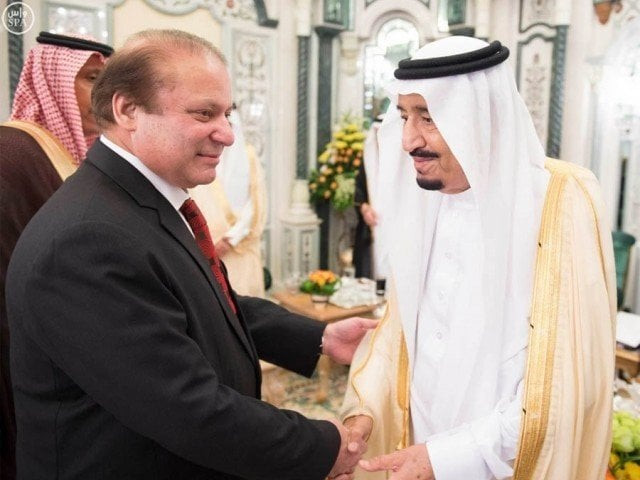Don’t snub the Saudis
Saudis would not hesitate to round up Pakistani workers and send them packing just to send a message across

PHOTO COURTESY: SPA
Pak-Saudi relations: Friends with benefits
Estimates suggest that over 1.5 million Pakistanis live in Saudi Arabia, who, according to the State Bank of Pakistan, sent remittances of almost $5.6 billion in 2014. An additional $4.2 billion in remittances flowed in from the United Arab Emirates, a member of the Gulf Cooperation Council (GCC) and a close ally of Saudi Arabia. Other countries from the GCC provided an additional inflow of $2.1 billion during the same period. These figures are important, mainly because the billions of dollars flowing in from the GCC keep Pakistan afloat. Furthermore, the opportunities provided to the millions of Pakistanis in the GCC, many of whom work as blue collar workers, enable their families to improve their socioeconomic conditions at home.
A rupture in Pakistan’s relationship will impact the ease with which migrants from Pakistan are able to find work in Saudi Arabia and the GCC, and can potentially lead to an inflow of hundreds of thousands of unemployed workers into the country. A government that has repressed its own citizens when needed, the Saudis would not hesitate to round up Pakistani workers and send them packing just to send a message across. Pakistan’s economy, already struggling to create significant job opportunities for its labour force, will struggle to rehabilitate any number of migrants coming back from the GCC. Furthermore, the decline in the inflow of remittances could ultimately create a foreign exchange crisis at home, depreciating the rupee and further constraining the economy’s ability to grow. Given this reality, Saudi Arabia has tremendous leverage that it could use against Pakistan should it feel that its long-term ally is snubbing it internationally.
Re-forging foreign policy
Regional and geopolitical realities further constrain Pakistan’s foreign policy options. Since the Iranian Revolution in 1979, Pakistan has had distant ties with Iran. Historically, the Iranians have drawn closer to India, while Afghanistan, always fearful of Pakistan’s overbearing role, has also trusted India more. While Saudi Arabia has maintained a strategic relationship with Pakistan, it has also hedged its bets by building ties with India. In 2006, the late King Abdullah became the first Saudi monarch in decades to visit New Delhi, concluding his trip by signing a strategic energy pact. India’s then prime minister Dr Manmohan Singh further cemented the ties by visiting Saudi Arabia in 2010 and signing a whole host of agreements. The relationship between the two nations became strategic in nature when the Saudi Crown Prince Salman bin Abdul Aziz al Saud visited New Delhi and signed a Memorandum of Understanding on defence cooperation. Given these regional realities, an icy relationship between Islamabad and Riyadh will only draw the Saudis closer to India, ultimately leading to isolation for Pakistan, both regionally and internationally. With the Americans already distancing themselves from the region, Pakistan will only be left with one regional and international ally: China.
Finally, the domestic situation within Pakistan limits its room for manoeuvre. Not only are right-wing groups in the country rampant, they possess kinetic and non-kinetic abilities to ratchet up the pressure at home. For years these groups have been provided patronage by organisations and well-heeled individuals in the GCC. Should relations between the Saudis and Pakistan deteriorate, these groups could be used to increase local pressure on the government. Even if the Saudis were not to use this option, the groups might act on their own, viewing Islamabad’s insistence to distance itself from Saudi Arabia as a move towards drawing closer to Iran, a country that many radical groups view as an enemy. The government is already trying to normalise relations with India and Afghanistan without upsetting such groups, and the opening up of a third front could disrupt the entire strategy.
Rethinking Pak-Saudi relations
The government has made the right decision by not committing troops in the Saudi-led alliance, while agreeing on counterterrorism cooperation. Pakistan’s armed forces are already stretched thin and have been fighting a local insurgency in Fata, Balochistan and Karachi. This by itself constrains the country’s ability to provide boots on the ground to any Saudi military adventures. However, openly slighting Riyadh should be out of the question. There is no doubt about the fact that Pakistan has suffered tremendously from the follies of the past, and most of this has been a result of blindly acceding to the wishes of its allies. In the current situation, however, the only option for the government is to deft touch and manoeuvre around the crisis with nuance. Stepping on an old ally’s foot, in such a tense situation, would be ill-advised. Policymakers in Islamabad can only pray that the anger dissipates and cooler heads prevail in Saudi Arabia and Iran.
Published in The Express Tribune, January 16th, 2016.
Like Opinion & Editorial on Facebook, follow @ETOpEd on Twitter to receive all updates on all our daily pieces.















COMMENTS
Comments are moderated and generally will be posted if they are on-topic and not abusive.
For more information, please see our Comments FAQ